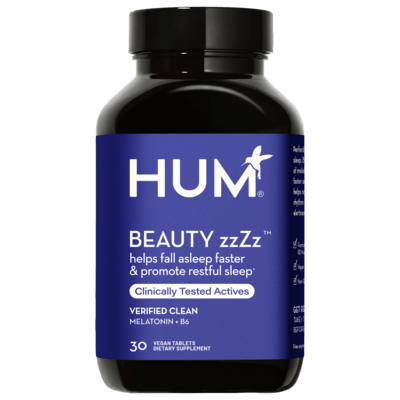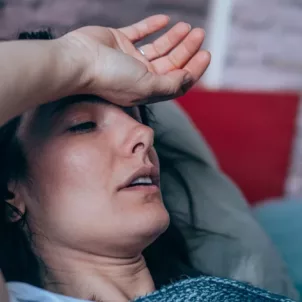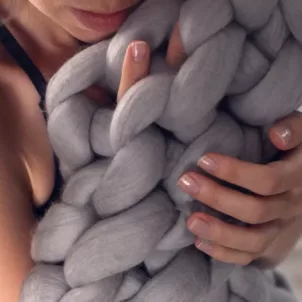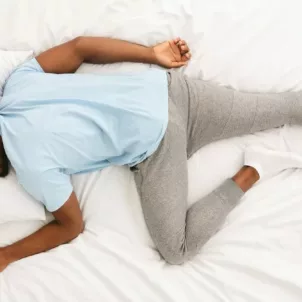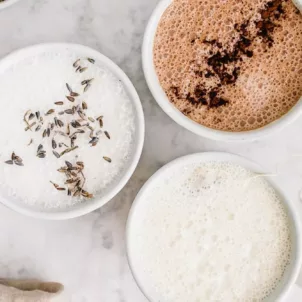Discover the best temperature for sleep that’s restorative, rejuvenating, and optimal for energy.
Sick of counting sheep as you toss and turn, only to rest your eyes for what feels like 15 minutes—and then be rudely awakened by the alarm? We’ve been there, felt that.
While what you eat and drink, how you move your body, your stress levels, and so much more can impact the quantity and quality of your sleep each night, your environment could also be holding you back from your best rest, says Logan Foley, a certified sleep science coach and the managing editor for the Sleep Foundation in Seattle.
“Your sleep schedule is regulated by a system called the circadian rhythm,” Foley explains. This is dictated by a part of the brain called the suprachiasmatic nucleus, which uses a variety of environmental cues, like light and temperature, to know when to tell the rest of your brain and body it’s time to turn in. And it turns out, there’s an ideal temp for getting the best Zzzzs.
Below, experts explain why temperature impacts sleep and the best temperature for sleep, so you can set your thermostat, well, stat. Plus, tricks and tools that can help you chill out and rest easier.
The Best Temperature for Sleep, According to Science
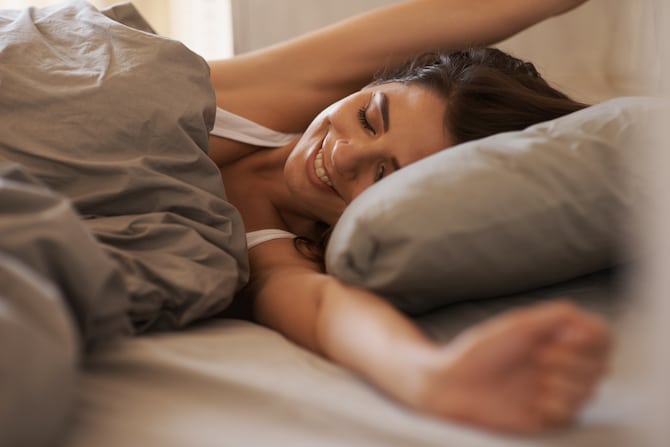
“The best temperature for sleep is between 60 and 67 degrees Fahrenheit,” Foley says.
Here’s why: Historically, our circadian rhythms have lined up with the rising and setting of the sun, which generally correlates with an increase and decrease in air temperature, respectively. (Consider this a relic from our hunter and gatherer days when we didn’t have the help of AC or electronics.)
Dim light and darkness prompt the release of the sleep hormone melatonin. “When melatonin is released, it also triggers a slight dip in core body temperature of about 2 degrees. This indicates to your brain that it’s time for sleep,” says Foley.
Overnight, our bodies “vasodilate,” or widen and relax blood vessels, to allow more blood to flow to the arms and legs—and flow away from the core to keep you cool. If you’ve ever noticed that you wake up with sweaty hands or feet, this process is likely why (unless you’re having a particularly nerve-wracking nightmare!).
All sounds good, right? Well, now that we have modern comforts (thank you heating, fluffy duvets, weighted blankets, and indoor lighting!) both our internal temps and environmental temps are typically warmer come bedtime.
If your bedroom is too toasty, it can interfere with this natural process and upset its thermoregulation abilities, according to a 2018 study in the journal Nature. This can lead to less restful sleep and fatigue the next day.
The Benefits of Sleeping in A Cold Room
“Since our bodies are naturally inclined to lower our core body temperature at night, lowering the temperature in your bedroom may help indicate to your body that it’s time for sleep,” Foley says. This means it might be able to help you get to sleep faster.
Beyond alerting our bodies that it’s time to snooze, the ideal temperature can also improve the quality of our sleep as well—and the multitude of benefits that come with it.
“Keeping the room warm may increase body temperature and tell the brain to stay alert,” says Carleara Weiss, Ph.D., a sleep science advisor at Aeroflow Healthcare’s Sleep division. “With that, you may wake up several times during the night, having a night of fragmented and non-restorative sleep. In other cases, you may wake up and be unable to fall asleep again.”
Hot temperatures have been shown to reduce time in the restorative “NREM” sleep stage, Foley adds, which is the vital time when the brain “cements” what you learned that day and flushes out waste by-products that can be toxic for cognitive health. NREM is also when the body repairs tissues, builds bones and muscles, and bolsters the immune system.
Cooler environmental temperatures—around the low- to mid-60s—can ease the body into “REM” sleep, the stage just prior to NREM in which our bodies relax and dreams take place.
What About Hot Sleepers?
Lowered the A.C. but still wondering, “Why do I get hot when I sleep?” Certain circumstances make us more likely to slip under the covers already scorching, even if the air is within the best temperature for sleep range.
“Women in menopause may experience hot flashes and have difficulty falling asleep or staying asleep as a consequence of the rise in body temperature. Pregnancy also increases body temperature so that pregnant women may experience sleep difficulties,” Weiss says, often due to hormonal and body size changes. “And individuals with untreated obstructive sleep apnea who are not wearing a CPAP or not regularly adjusting the CPAP flow with doctor visits may have problems with the regulation of body temperature due to dysregulation of the oxygen flow.”
Talk to your doctor if night sweats are keeping you up (and check out below for products that might be particularly helpful).
All else being equal, “there’s no one certain type of person who may feel warmer during sleep,” Foley says. So if the 60- to 67-degree range feels off, feel free to test out another level for a night or two. “Everyones’ preferences are different, and some people are more comfortable with a bedroom outside the recommended range,” Foley says.
How to Stay Cool While You Sleep
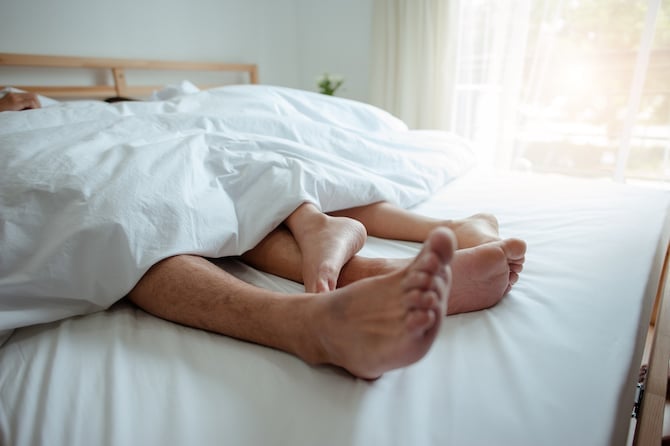
Since Weiss and Foley are well aware of the best temperature for sleep (and all of the benefits it can offer to their overall rest and recovery), they get proactive before tucking in. Follow their lead to keep cool during your bedtime routine:
- Do a temp check. “I set my thermostat to 63 degrees about an hour before bed so my bedroom has time to cool down so it’s perfect by the time I crawl into bed,” Foley says. If you don’t have air conditioning, try shifting your sleeping space to a basement at night during the summers, she suggests. Or close your blinds during the hottest parts of the day; windows are where about 30 percent of unwanted heat sneaks into your home.
- Take a warm bath or shower. “The warm water stimulates the natural thermoregulation in our bodies, signaling that it’s time to reduce the body temperature to counter-effect the water temperature from the shower or bath,” Weiss says. When you step outside into the cooler bathroom air, your body is already on its way to chilling out.
- Sleep with the window open. If it makes sense (in other words, isn’t too loud, unsafe or too hot), crack open a window, Foley says. The airflow can help with ventilation.
- Let your feet fly free. “Having the feet outside of the blanket helps lower the body temperature and promote good sleep quality,” Weiss says. “If that becomes difficult during winter, you can have socks on and keep the blanket on the rest of the body.”
- Dress wisely. Loose, light and breathable clothing will help your skin stay cool as well.
- Shop smart. “Reduce your sweating with sleep products that promote cooling,” Foley says, like the items below.
Sleep Accessories to Help You Cool Down
Upgrade your bedroom with products that help keep you cool at night. These are a few of our favorites:
Best Cooling Mattress: Helix Midnight Luxe
The Sleep Foundation selected the Helix Midnight Luxe ($1,749 for a queen) as their overall best cooling mattress of 2021 for good reason. Its two-layer memory foam technology above packaged coils offers ample support for any sleeping position, and all of that is topped with a cover that offers enough breathability so you can chill out.
Best Cooling Sheets: SHEEX Original Performance Sheet Set
Constructed with moisture-wicking, wrinkle-resistant polyester and spandex, SHEEX Original Performance Sheet Set ($188 for a queen set) are designed to help you maintain an even body temperature from head to toe—and all night long.
Best Cooling Pillow: Birch Organic Pillow
Sustainably-sourced ingredients star in the Birch Organic Pillow ($99). Cotton, cruelty-free wool and natural latex team up in the breathable and moisture-wicking headrest.
Best Bedroom Fan: Dyson Pure Cool Link
Sized-right for a nightstand, the Dyson Pure Cool Link ($400) purifies the entire room of air while emitting a powerful cool breeze (when you select that setting). Its night setting is super-quiet, and the whole appliance is a breeze to adjust through a connected app or via voice controls.
